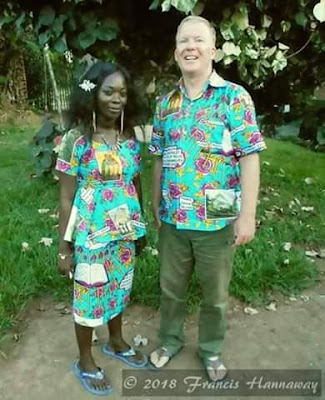Fr Joseph, one of our diocesan priests, who works 500 km from us, came to visit Basankusu.
“How are things with Mill Hill?” he asked.
“How are things with the Congo?” I replied. And so began our conversation.
Fr Joseph had seen many changes in the country over the years. We sat with a cold glass of beer each.
“You’ll be happy that the presidential elections will soon be taking place,” I continued.
He looked cynical. “The elections are already two years overdue.” he said. “This imposter has stayed in power long enough. He’s either killed or imprisoned his opposition, or driven them into exile. Demonstrations are brutally stamped on; even in January 2018 his police entered churches and shot people.”
President Joseph Kabila came to power after the assassination of his warlord father, in 2001.
“But now at least we’ll have elections on 23 December,” I replied.
“Elections of a sort,” he said. “The opposition candidates are all prima donnas who can’t agree on a single candidate. The electronic voting machines haven’t been distributed to every village ... and there won’t be the power to charge them. Anyway, tell me about Mill Hill. Where is Fr. John Kirwan?”
“Fr John went back to England with a bad back, but I’m happy to say he’s completely recovered.” I said.
“I’ve known him over many years,” said Fr. Joseph, his eyes sparkling. “He has given great service as a missionary here!”
“Fr. John has been asked to consider retirement. It will be a sad loss after thirty-eight years.”
Fr. Joseph looked troubled, but then asked, “What about your colleagues, Fr. Stan and Fr. Otto ... and what about new missionary priests being appointed?”
I told him about Fr. Stan, having been ill but now on his way back to Basankusu, and of Fr. Otto in Kinshasa setting up our new seminary. As for new appointments, we have about thirty seminarians from Kenya, Uganda, Cameroon, and Congo. So it’s quite possible new people will soon be sent.
“Ah, yes, I knew Otto and Stan when they were at school. And what about yourself?”
“I’m looking forward to continuing my work with malnutrition. In four years we’ve treated 2,500 children. Last week we gave our seventeenth wheelchair-bike - all paid for by kind donations sent by people from Middlesbrough Diocese.”
A broad smile spread across Fr. Joseph’s face as he lifted his glass.
“Well, here’s to 2019.” he said. “Let’s hope we have a new, good president, that your students do well, and people continue to support your work with malnutrition and wheelchairs.”
[Just before the election date of 23 December a fire destroyed 8,000 voting machines, solar panels and a dozen or so cars destined for the election in Kinshasa. The date of the election was moved to December 30.]
“How are things with Mill Hill?” he asked.
“How are things with the Congo?” I replied. And so began our conversation.
 |
| Francis Hannaway |
Fr Joseph had seen many changes in the country over the years. We sat with a cold glass of beer each.
“You’ll be happy that the presidential elections will soon be taking place,” I continued.
He looked cynical. “The elections are already two years overdue.” he said. “This imposter has stayed in power long enough. He’s either killed or imprisoned his opposition, or driven them into exile. Demonstrations are brutally stamped on; even in January 2018 his police entered churches and shot people.”
President Joseph Kabila came to power after the assassination of his warlord father, in 2001.
“But now at least we’ll have elections on 23 December,” I replied.
“Elections of a sort,” he said. “The opposition candidates are all prima donnas who can’t agree on a single candidate. The electronic voting machines haven’t been distributed to every village ... and there won’t be the power to charge them. Anyway, tell me about Mill Hill. Where is Fr. John Kirwan?”
“Fr John went back to England with a bad back, but I’m happy to say he’s completely recovered.” I said.
“I’ve known him over many years,” said Fr. Joseph, his eyes sparkling. “He has given great service as a missionary here!”
“Fr. John has been asked to consider retirement. It will be a sad loss after thirty-eight years.”
Fr. Joseph looked troubled, but then asked, “What about your colleagues, Fr. Stan and Fr. Otto ... and what about new missionary priests being appointed?”
I told him about Fr. Stan, having been ill but now on his way back to Basankusu, and of Fr. Otto in Kinshasa setting up our new seminary. As for new appointments, we have about thirty seminarians from Kenya, Uganda, Cameroon, and Congo. So it’s quite possible new people will soon be sent.
“Ah, yes, I knew Otto and Stan when they were at school. And what about yourself?”
 |
| Francis Hannaway with Judith Bondjembo |
“I’m looking forward to continuing my work with malnutrition. In four years we’ve treated 2,500 children. Last week we gave our seventeenth wheelchair-bike - all paid for by kind donations sent by people from Middlesbrough Diocese.”
A broad smile spread across Fr. Joseph’s face as he lifted his glass.
“Well, here’s to 2019.” he said. “Let’s hope we have a new, good president, that your students do well, and people continue to support your work with malnutrition and wheelchairs.”
[Just before the election date of 23 December a fire destroyed 8,000 voting machines, solar panels and a dozen or so cars destined for the election in Kinshasa. The date of the election was moved to December 30.]
































